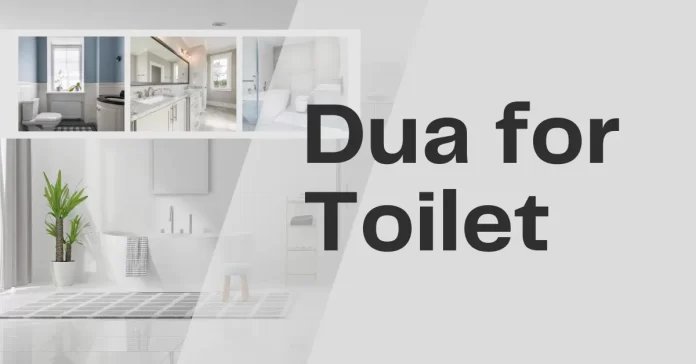Introduction
In Islam, there are numerous practices and prayers that guide Muslims in their daily lives. Among these, the “toilet dua” holds a significant place. This blog will delve into the importance of this simple yet profound practice, its origins, and the spiritual benefits it offers.
What is the Toilet Dua?
The term “toilet dua” refers to the specific prayers that Muslims recite before entering and after leaving the restroom. These prayers are meant to seek protection from impurities and harmful entities, as well as to thank Allah for the relief provided.
The Origins
Historical Context
The practice of reciting duas before and after using the toilet dates back to the time of the Prophet Muhammad (peace be upon him). He taught his followers various supplications for different daily activities, including the act of relieving oneself. These teachings have been preserved in Hadith literature and are followed by Muslims around the world.
The Hadiths
Several Hadiths reference to this, emphasizing its importance. For instance, one Hadith narrated by Anas ibn Malik states:
“When the Prophet (peace be upon him) entered the toilet, he used to say: ‘Allahumma inni a’udhu bika minal khubthi wal khaba’ith’ (O Allah, I seek refuge with You from male and female devils).”
This Hadith highlights the practice of seeking protection from evil entities while entering a place considered impure.
The Importance of Toilet Dua
Spiritual Significance
Reciting the toilet dua is a means of maintaining spiritual cleanliness. It reminds Muslims to stay conscious of their actions and surroundings, even during mundane activities. The dua helps in maintaining a spiritual connection with Allah throughout the day.
Protection from Harm
Islamic teachings emphasize that restrooms are places where impurities and potentially harmful entities reside. By reciting the toilet dua, Muslims seek protection from these negative influences, ensuring their spiritual well-being.
Hygiene and Cleanliness
Islam places a strong emphasis on cleanliness. The toilet dua serves as a reminder of the importance of hygiene and cleanliness, not just physically but also spiritually. This practice encourages Muslims to maintain a pure and clean state.
How to Perform the Toilet Dua
Before Entering the Restroom
Before entering the restroom, Muslims recite the following dua:
“Bismillah, Allahumma inni a’udhu bika minal khubthi wal khaba’ith.”
This translates to:
“In the name of Allah, O Allah, I seek refuge with You from all evil and evil-doers.”
After Leaving the Restroom
After leaving the restroom, Muslims recite the following dua:
“Ghufranaka.”
This translates to:
“I seek Your forgiveness.”
Practical Tips for Remembering the Toilet Dua
Incorporate it into Daily Routine
One of the best ways to remember the toilet dua is to incorporate it into your daily routine. Make it a habit to recite the dua every time you use the restroom.
Use Reminders
Place reminders in the form of small notes or stickers near the bathroom door to prompt you to recite the dua before entering and after leaving.
Teach Children Early
Instill the habit of reciting the toilet dua in children from a young age. This practice will become second nature to them as they grow older.
Common Questions About Toilet Dua
Is it Necessary to Recite the Toilet Dua?
While it is not obligatory, reciting the toilet dua is a highly recommended practice. It offers spiritual protection and aligns with the Sunnah of the Prophet Muhammad (peace be upon him).
Can the Dua be Recited in Any Language?
The toilet dua is traditionally recited in Arabic. However, if someone is unable to recite it in Arabic, they can say it in their own language, keeping the intention and meaning intact.
The Broader Impact of Toilet Dua
Enhancing Mindfulness
The practice of reciting the toilet dua enhances mindfulness. It encourages Muslims to be conscious of their actions and surroundings, promoting a holistic approach to spirituality and daily life.
Building a Spiritual Connection
By incorporating the toilet dua into daily routines, Muslims strengthen their spiritual connection with Allah. This simple act of remembrance fosters a deeper sense of gratitude and dependence on the divine.
Conclusion
The toilet dua, though seemingly simple, holds profound significance in the lives of Muslims. It is a practice deeply rooted in Islamic tradition, offering spiritual protection, promoting cleanliness, and enhancing mindfulness. By incorporating the toilet dua into daily routines, Muslims can maintain a constant connection with Allah, even in the most mundane activities.
Embracing the toilet dua is a step towards holistic spiritual well-being, reminding Muslims of the importance of purity and gratitude in every aspect of life. Whether you are new to this practice or looking to deepen your understanding, the toilet dua is a powerful reminder of the divine presence in our daily lives.
Final Thoughts
In a world where we often rush through our daily routines, taking a moment to recite the toilet dua can bring a sense of peace and mindfulness. It is a small but significant act that aligns with the Islamic emphasis on cleanliness, both physical and spiritual. As you incorporate this practice into your life, may it serve as a constant reminder of Allah’s presence and protection.
By understanding and practicing the toilet dua, Muslims can elevate their daily routines into acts of worship, finding spiritual meaning in even the most mundane activities. Let this practice be a testament to the comprehensive nature of Islam, guiding its followers towards a life of purity, mindfulness, and divine connection.
Listen to Toilet Dua
Frequently Asked Questions (FAQs)
Q1: Can the dua be recited silently?
A1: Yes, the dua can be recited silently or in a low voice before entering the toilet.
Q2: What if I forget to recite the dua before entering the toilet?
A2: If you forget, you can still recite it as soon as you remember, even if you are already inside.
Q3: Is it necessary to recite the dua every time?
A3: While it is highly recommended and beneficial, it is not obligatory. However, making it a habit ensures spiritual protection and adherence to Sunnah.
Q4: Can children recite the dua?
A4: Absolutely. Teaching children the dua from a young age helps inculcate the habit and understanding of Islamic practices.
Q5: Is there a specific time for reciting the dua?
A5: The dua should be recited just before entering the toilet, regardless of the time of day.
By adopting this simple yet powerful practice, we can enhance our spiritual discipline and remain mindful of Allah’s presence in every aspect of our lives.

